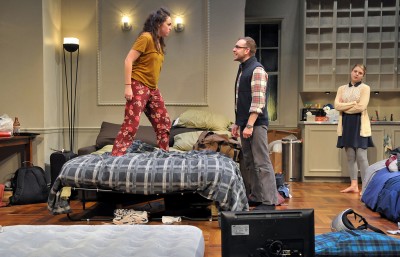Who’s to discern the difference between a good Jew and a bad Jew? Joshua Harmon, a recent graduate of The Julliard School’s Lila Acheson Wallace American Playwrights Program, has written a biting, comedic commentary that bravely attempts to hash out the balance between religion, family and practicing one’s personal beliefs.

Harmon’s original play, “Bad Jews,” premiered fall 2013 at the Roundabout Theatre Company in New York. Boston’s own SpeakEasy Stage Company is the first New England theatre to take a crack at shocking audiences with the play’s controversial yet hilarious subject matter.
Three Jewish cousins — Daphna (Alison McCartan), Liam (Victor Shopov) and Jonah (Alex Marz) — are crammed into an Upper West Side apartment the night following their grandfather’s funeral. Tensions rise to an unbearable degree when Daphna self-righteously proclaims that, of the three grandchildren, she is most strongly connected to her faith and is therefore entitled to their late Poppy’s Chai necklace — a necklace bearing the Hebrew word for life.
At the beginning of the play, the audience is introduced to Jonah, a rather complacent and removed young college student who has resigned to playing Xbox in his boxers as Daphna rants on about her faith. At the crux of her rambling is Liam, the eldest grandchild and the only one to miss the funeral due to a fateful drop of his phone on a ski lift in Aspen.
While McCartan toes the edge of erratic, her overall performance of an overzealous, egotistical maniac was well served. With Liam nowhere to be seen early on, the audience can only assume the worst of his character before he even steps through the door due to Daphna’s endless. When he finally arrives, the blonde-haired, blue-eyed girl standing by his side only helps her case.
As it turns out, Poppy’s Chai necklace has already gone to Liam and he’s planning to propose to his new girlfriend, Melody (Gillian Mariner Gordon). When this news gets out, the gloves come off.
Daphna and Liam verbally demolish each other in a way that neither Jonah nor Melody has ever seen. At the height of Shopov’s perfectly executed rant, he screams, referring to Daphna, “Her little Talmudic personality grows in two seconds, like those sponges you put in water, and she becomes this little uber-Jew, lording her fanaticism over everyone.”
Never at a loss for words, Daphna fights back with everything she has, including the long line of “inferior girlfriends” that has filled Liam’s life as well as his haste to pronounce his Judaism only in the presence of an Israel-Palestine debate. While both sidesplitting and appropriately grave, the constant haranguing tends to drag on with no clear point in sight.
While the issues at the center of “Bad Jews” — including remembering where one has come from — are noteworthy enough to uphold a memorable story, the back-and-forth between feuding cousins never seems to end, even as the lights go down.
Nevertheless, “Bad Jews” does handsomely call attention to “watering down the Bible to fit our 21st century sensibilities,” as put by Liam. The audience is encouraged to ask themselves, “What happens when our faith is all water, no substance, all sensibilities?”
In its entirety, the SpeakEasy cast, under the direction of Rebecca Bradshaw, does an admirable job of raising this question with thought-provoking laughter. Perhaps that is Harmon’s endgame: raise awareness of an issue and get the audience thinking about where they came from as well as where they’re going. In that case, “Bad Jews” is two hours of a job well done.
“Bad Jews” will run through Nov. 29 in the Nancy and Edward Roberts Studio Theatre in the Stanford Calderwood Pavilion at the Boston Center for the Arts. To purchase tickets, visit the SpeakEasy website.














